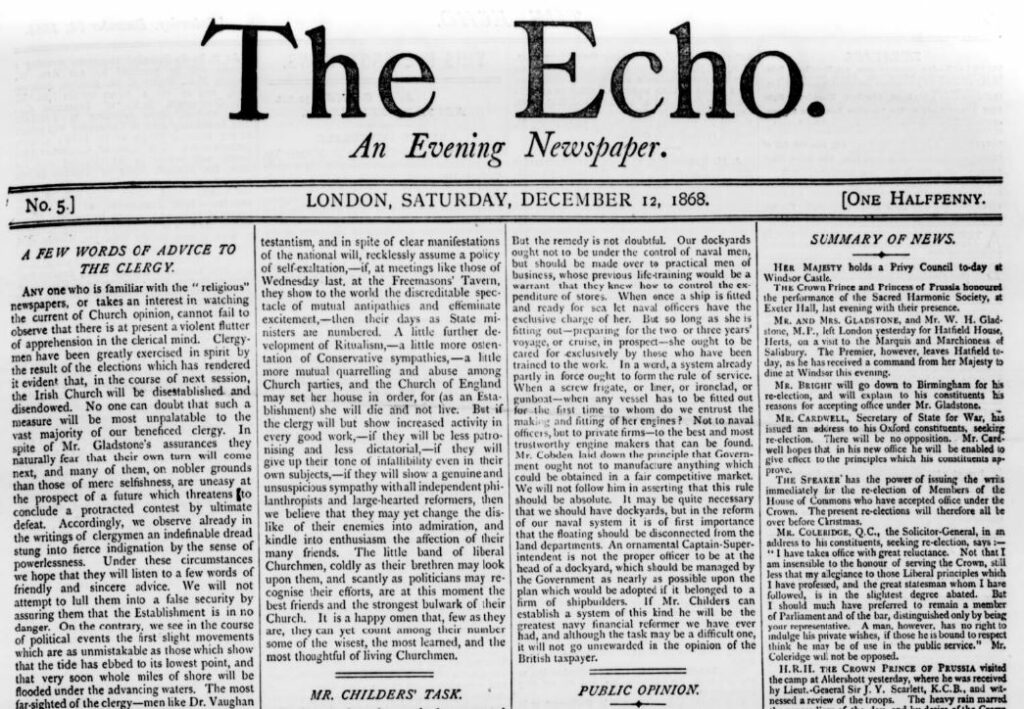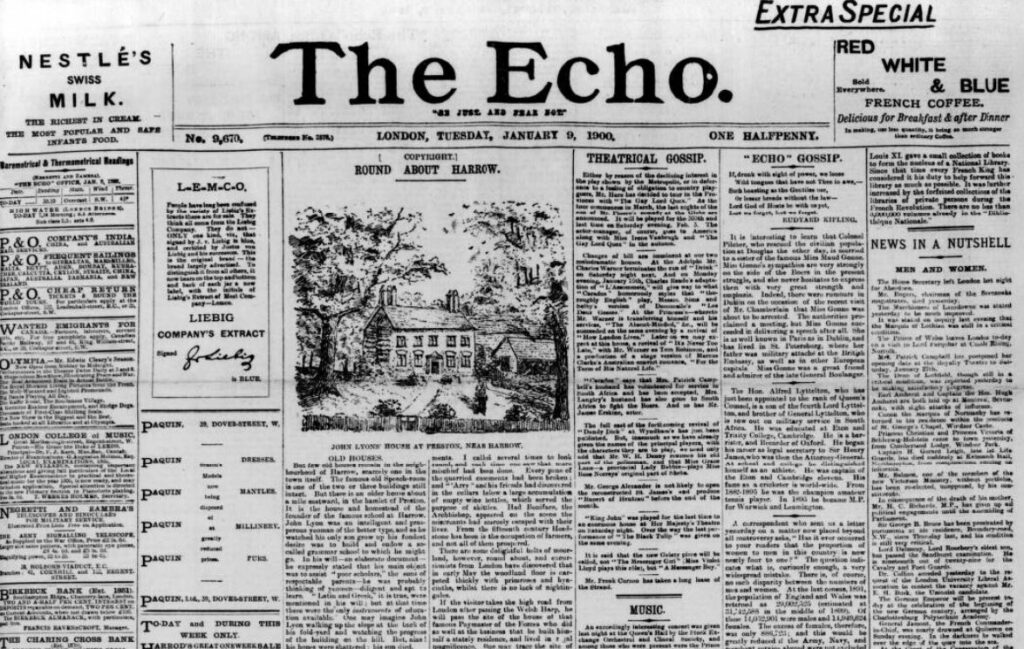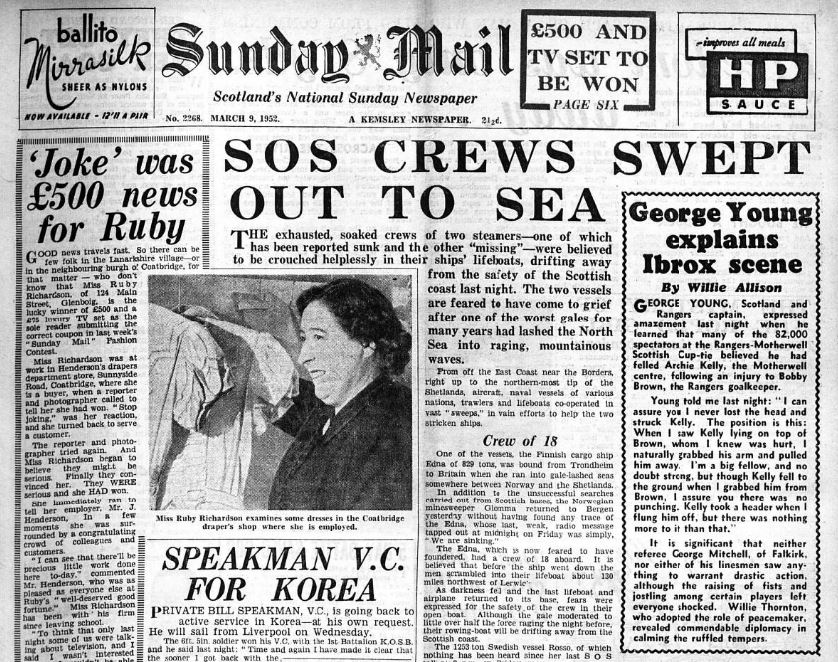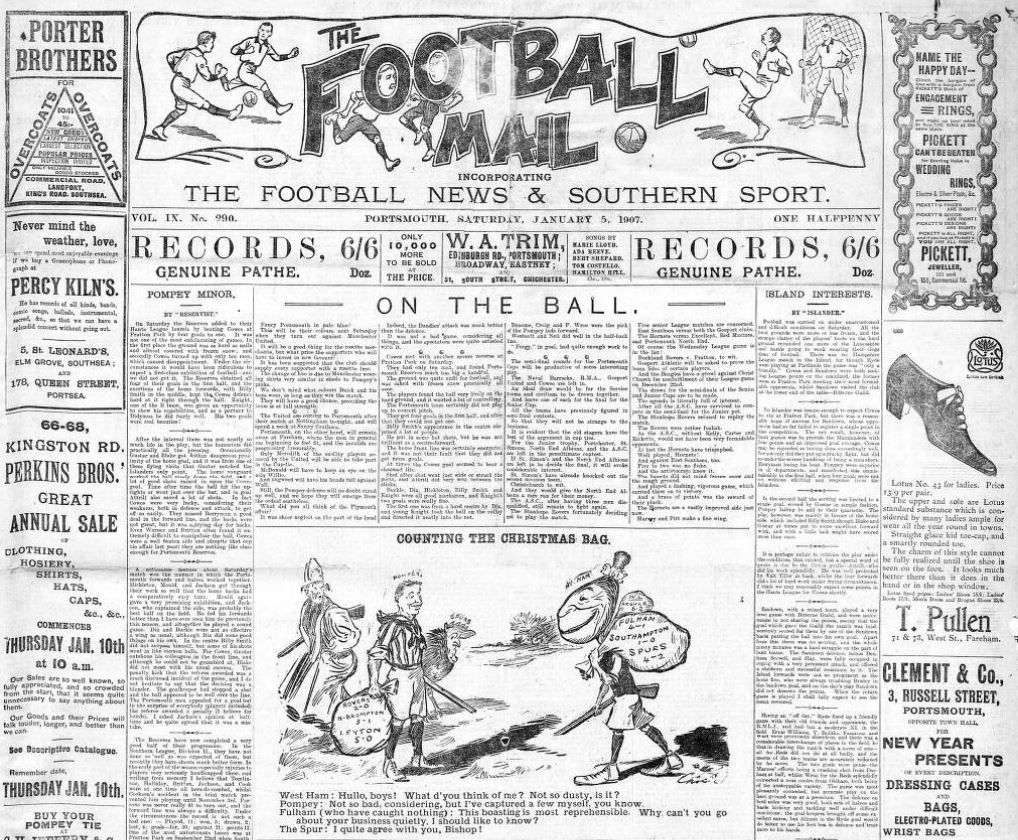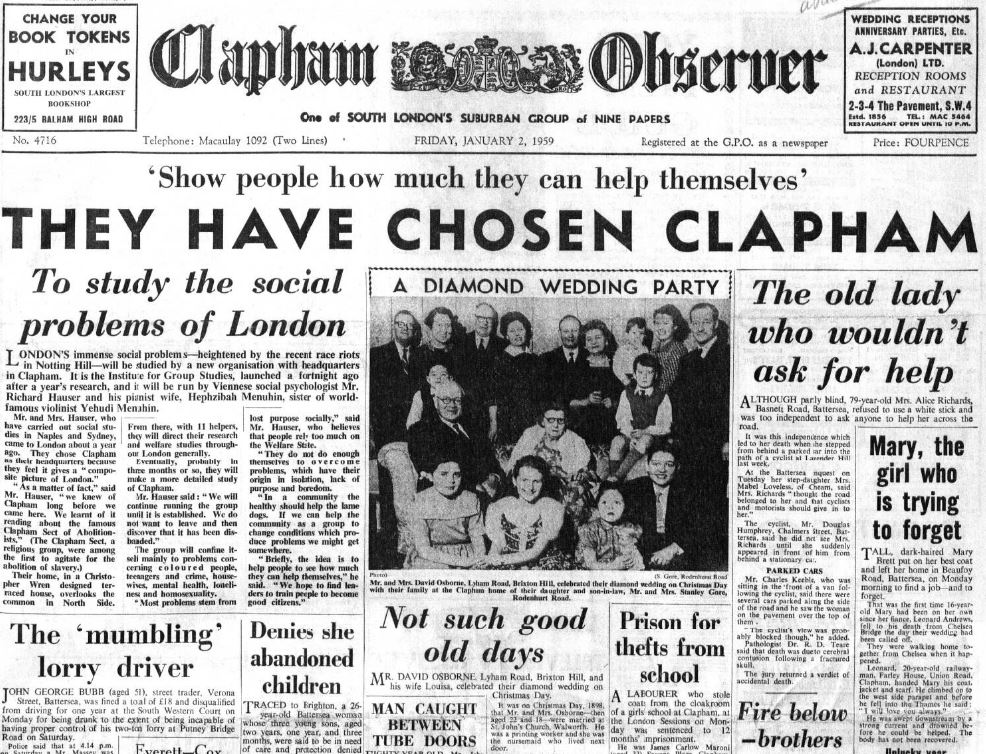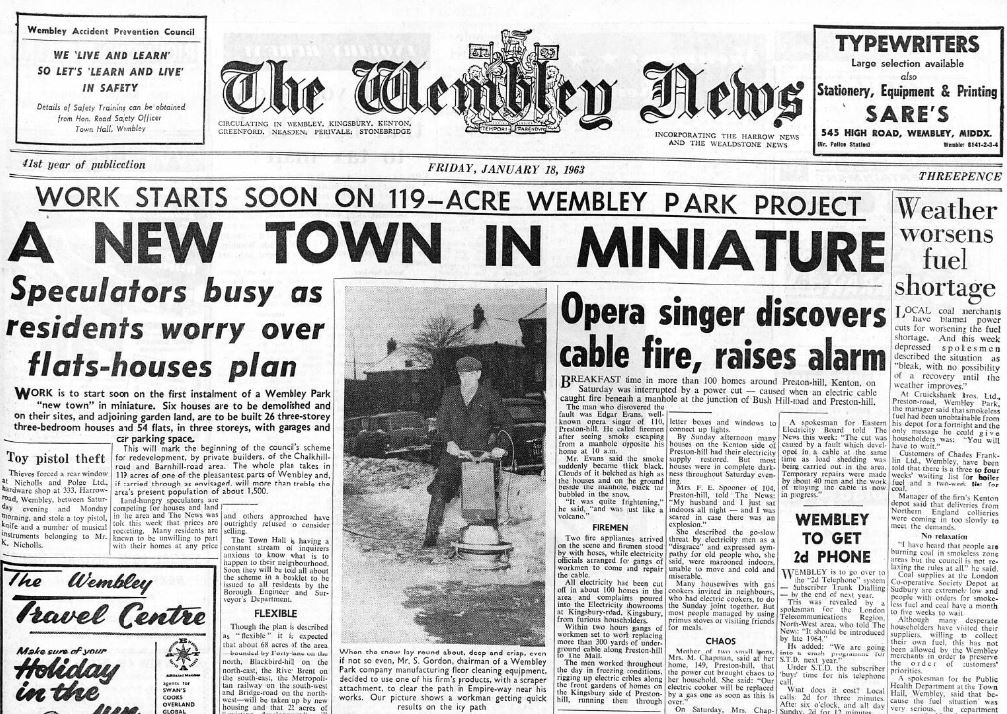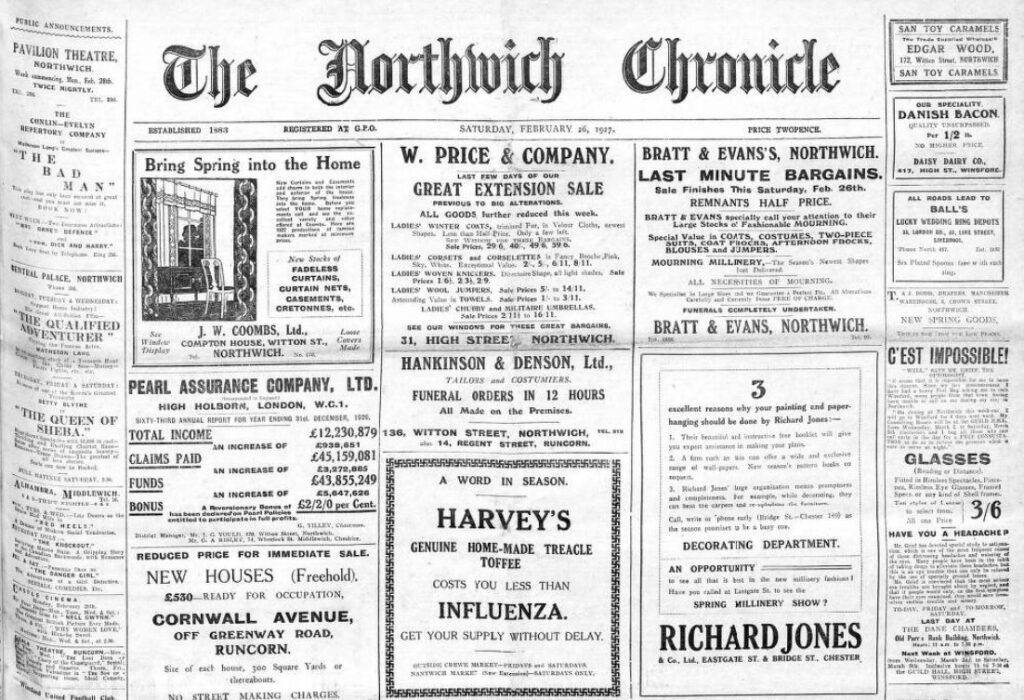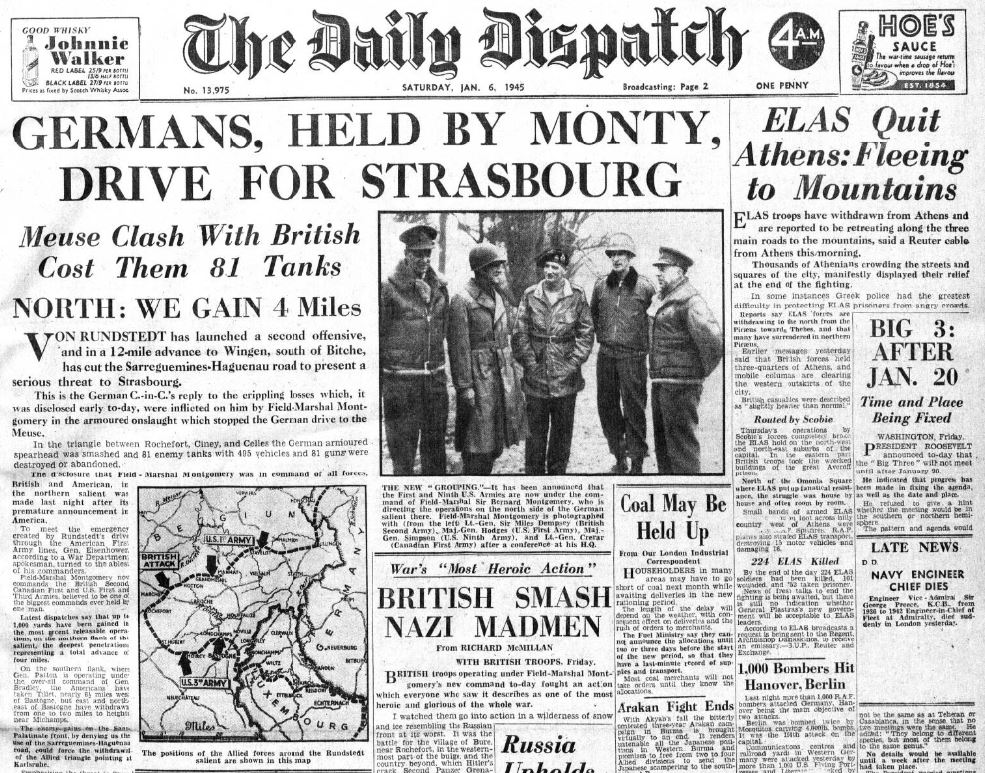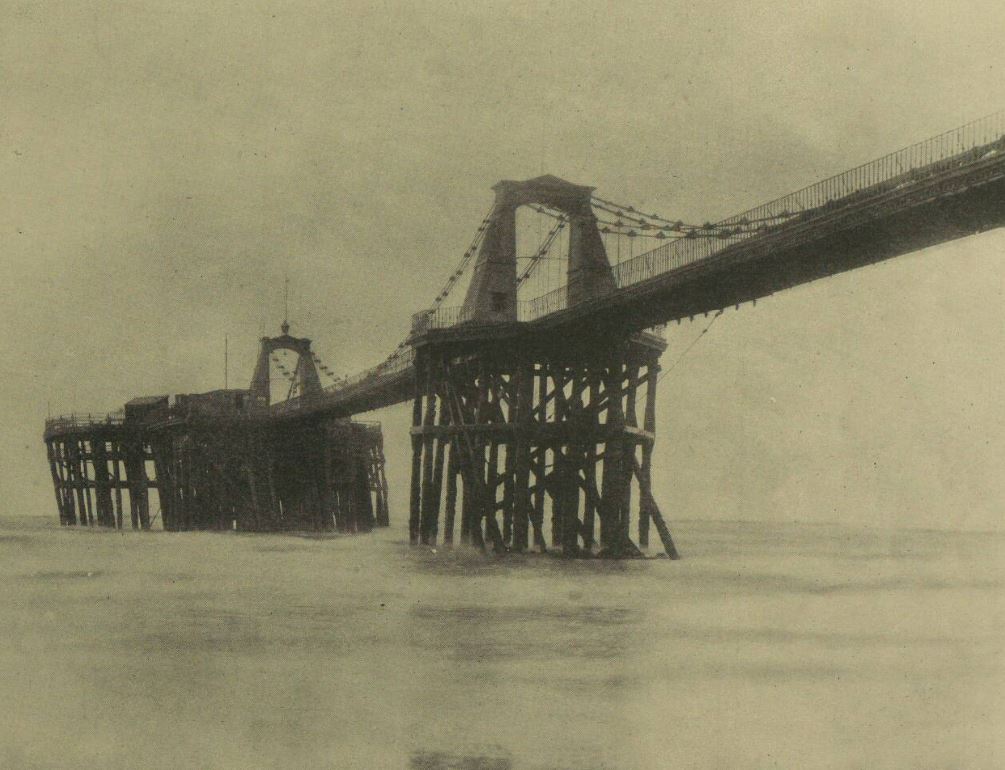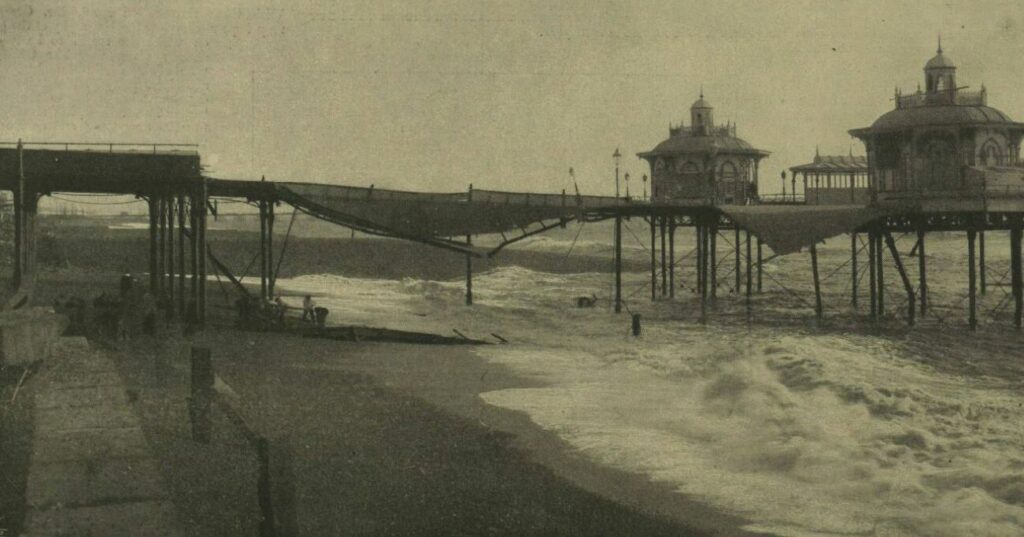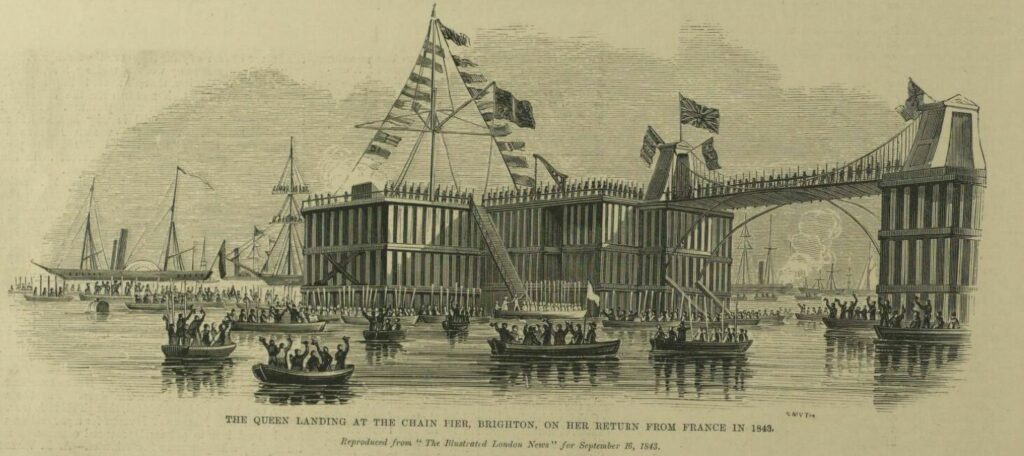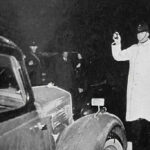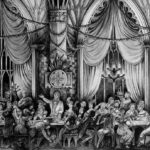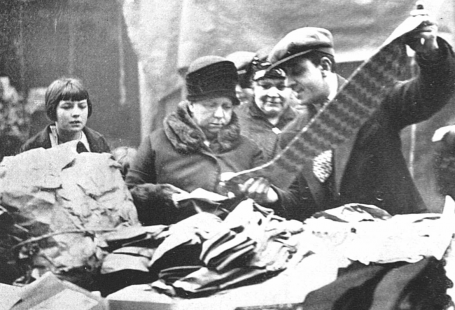This week at The Archive we have added 407,285 brand new pages, whilst we’re delighted to welcome London’s first ever halfpenny newspaper the Echo to our collection, one of the eight brand new newspapers that have joined us over the past seven days. Meanwhile, as the World Cup plays out in Qatar, we’ve added a brand new specialist football title from Portsmouth, as well as important Scottish Sunday newspaper the Sunday Mail (Glasgow).
We’ve not neglected our existing titles either. From Accrington to Aldershot, from Birmingham to Bristol, from Leicester to Liverpool, from Neath to Newcastle, we’ve updated 72 of our existing titles from across England, Wales and Scotland.
So read on to find out more about all of our new and updated titles of the week, as well as to learn about a severe storm that hit the seaside town of Brighton in December 1896, which damaged the resort’s historic Chain Pier.
Register now and explore the Archive
The first of our new titles this week is the Echo (London), which was founded in 1868 as London’s first ever halfpenny newspaper. Liberal in its politics, the Echo was founded by publishers Cassell, Petter, Galpin & Co., its first editor being Arthur Arnold (1833-1902). Arnold supported a range of causes, from women’s suffrage to the temperance movement, and was president of the Free Land League and a member of the London Anti-Vivisection Society. He became the Liberal M.P. for Salford in 1880.
The first edition of the Echo appeared on 8 December 1868, filling four pages. It announced how it would be the newspaper’s ‘duty, as serving the nation at large, to criticise the government with impartiality.’ To this end, the Echo included reports from parliament, as well as including commentary on the social issues of the day, such as a look at the ‘Dwellings of the Poor.’
The Echo also printed a range of international news, publishing ‘Reuter’s Telegrams,’ which related the latest updates from Turkey, Greece, France, Italy, America, India and beyond. The newspaper, meanwhile, contained a ‘Summary of News,’ as well as a look at the ‘Money Market,’ the latest from the theatres, and pubic opinion. Finally, the Echo printed notices of births, marriages and deaths, with its final page given over to a range of different advertisements.
In 1876 Cassell, Petter, Galpin & Co. sold the Echo to Albert Grant, who then just a year later sold it on to journalist and philanthropist John Passmore Edwards (1823-1911). Whilst Passmore Edwards’s initial forays into the publishing world were unsuccessful, his Sentinel of the 1850s being a failure, he saw more success after his purchase of the Building News in 1862, and the establishment of the two-penny weekly English Mechanic.
In 1884 Passmore Edwards, who refused a knighthood twice, sold two-thirds of his share in the Echo to Scottish-American industrialist and philanthropist Andrew Carnegie (1835-1919), on the proviso that Carnegie would follow a set social and political agenda. However, following a disagreement, Passmore Edwards returned as editor until 1896, when a syndicate established for the very purpose of buying the newspaper took over.
It was after this point that the Echo began to struggle financially. The controlling share was sold to Frederick William Pethick-Lawrence (1871-1961), who would go on to serve in the Labour party. He ran the Echo until 1905, when publication stopped with the 11,391st issue on 31 July 1905. However, you will find editions of the Echo in the British Library up until 1907. Dated up until 1907, with different edition numbers, these copies contain the very same news that was printed on 31 July 1905. These copies were registration copies, published to prevent the title being used by another publisher, meaning the Echo echoed its news for several more years to come.
The Echo is a fascinating Liberal newspaper, and during its time in print, it saw some fascinating contributors, one of whom was Anglo-Irish writer, philosopher and social reformer Frances Power Cobbe (1822-1904). She was one of the newspaper’s main leader writers from 1868 to 1875, and she was also prominently involved in Victorian animal advocacy groups, founding the National Anti-Vivisection Society in 1875.
From the evening news to the Sunday news, and we’re excited to welcome the Sunday Mail (Glasgow) to our collection of Scottish newspapers. This red-top Sunday newspaper was founded over one hundred years ago in 1914 as the Sunday Mail & Record, becoming known as the Sunday Mail from 1919 onwards. The sister paper to the Daily Record, the Sunday Mail is billed as ‘Scotland’s best read Sunday newspaper.’ It is, in fact, Scotland’s biggest selling newspaper, and it is still running to this day.
From Glasgow all the way down to Portsmouth, and we’re delighted to welcome special footballing title the Football Mail (Portsmouth) to The Archive. Originally published during the football season, and founded in 1903, the Football Mail appeared every Saturday, incorporating The Football News & Southern Sport.
Lively and informative, the four pages of the Football Mail took an in depth look at the local team, Portsmouth, addressing ‘Pompey’s Progress’ and recent encounters. Meanwhile, the Football Mail took a look at other local football news, with a column devoted to ‘Island Interests,’ that is to say, football on the Isle of Wight, as well as looking at results and news from different local leagues, from the Southern League, the Portsmouth League, the Hampshire League, and the Fareham and District League.
Nothing if not thorough, the Football Mail printed league tables, and the details of upcoming games. It also featured cartoons, and commentary on the beautiful game.
By the 1950s the Football Mail had expanded to fill eight pages, now printing photographs alongside its reporting of various matches. It also looked beyond football to publish reports on rugby. Produced by the Portsmouth Evening News, the title became known as the Sports Mail, until it was closed in 2012. Upon a widespread public outcry, the Sports Mail was resurrected, until being closed for good in 2017.
We travel to London now for our next two new titles of the week, and we begin in the capital’s south west with the Clapham Observer, which was established in 1866. Appearing every Saturday at the cost of one penny, the Clapham Observer was politically neutral and circulated in Lambeth, Brixton, Streatham, Clapham, Tooting, Balham, Wandsworth, and ‘the district of Mid and East Surrey.’
Still going in the 1950s, the Clapham Observer was a thorough local newspaper that contained photographs of local people and events, including photographs of the weddings that had happened that week and the newly-married couples. Filling sixteen pages, the newspaper featured a variety of special interest pieces, looking at, for example, ‘A Postman’s Life 100 Years Ago.’ Alongside the local news, the Clapham Observer published a children’s column named the ‘Jolly Junior Club,’ as well as letters to the editor, and a special ‘Sportstalk’ section, which was dedicated to all things football and rugby.
From south west London now to north west London, and the home of football, Wembley, and we’re delighted to welcome the Wembley News to our collection this week. First published in 1922, the Wembley News circulated in Wembley, Kingsbury, Kenton, Greenford, Neasden, Perivale and Stonebridge in London’s north west, appearing every Friday. By the 1960s the Wembley News filled twelve pages, and incorporated the Harrow News and Wealdstone News. This title went out of print in 1975.
We move slightly further north now to introduce our next new title of the week, Bedfordshire’s Leighton Buzzard on Sunday. With its editorial offices in Luton, this newspaper was formerly the Leighton Buzzard News, a weekly freesheet tabloid that served the south Bedfordshire town of Leighton Buzzard, its neighbouring town of Linslade and the surrounding villages.
In 1997 the paper was relaunched as Leighton Buzzard on Sunday, before becoming the LB News in 2007. It ceased publication in 2010.
Our penultimate new title of the week is the Northwich Chronicle, which was established in 1885 as part of the Chester Chronicle series. Liberal in its politics, this Cheshire newspaper appeared every Friday before switching to a Saturday publication schedule.
By the 1920s the Northwich Chronicle cost two pence, and was noted for being thorough and informative, with a particular emphasis on sport. For example, the newspaper reported on the Cheshire County Football League, billiards in Northwich, the Middlewich anglers, as well as on polo. The Northwich Chronicle was also a goldmine of local news, containing the latest from Winsford Urban Council and the district news from the likes of Middlewich, Barnton, Winnington, Hartford, Kingsley, Moulton, Sandbach, Congleton and Frodsham.
Meanwhile, the newspaper also published serialised fiction and poetry, correspondence, notices of births, marriages and deaths, as well as farming news. By the 1980s the Northwich Chronicle filled 24 pages and cost fifteen pence.
Our final new title of the week is Manchester’s Daily Dispatch, which was founded in 1900 by Sir Edward Hulton (1869-1925), the British newspaper proprietor who also founded the Manchester Evening Chronicle. His father, also named Edward Hulton, founded the Sporting Chronicle, the Athletic News, and the Sunday Chronicle.
Appearing every day, bar Sundays, the Daily Dispatch cost just one penny and filled four pages. By the 1940s, the newspaper featured international news, as well as features written by prominent personalties of the day, such as Lord Woolton, the Minister of Reconstruction. The Daily Dispatch also featured a column for women, as well as a London letter, and sport and industrial news.
In 1955 the Daily Dispatch merged with the News Chronicle, which was founded in 1872. Five years later, in 1960, the title was then absorbed by national the Daily Mail.
That’s it for our new titles of the week, but we’ve got a feast of updated newspaper titles for you to enjoy. Leading the charge is the Cambridge Daily News, to which we have added over 107,000 brand new pages over the past seven days. Other updates of note are the over 15,000 brand new pages we have added to Sunday national tabloid The People, whilst over 12,000 brand new pages join the Liverpool Daily Post.
Meanwhile, we’ve updated three of our Scottish newspaper titles: the Dumfries and Galloway Standard, the Paisley Daily Express and the Irvine Herald. You can also discover updates this week to one of our Welsh titles, the Neath Guardian.
‘Terrific’ Storm Damage at Brighton – December 1896
In early December 1896 the coastal resort of Brighton, alongside the rest of the south coast, was hit by a severe storm, which caused considerable damage. Indeed, the old Chain Pier, Brighton’s first pier, which had been opened on 25 November 1823, was damaged beyond repair. The Chain Pier had been a landing stage for cargo boats, but as passengers from Dieppe arrived there, kiosks were established to cater for the visitors.
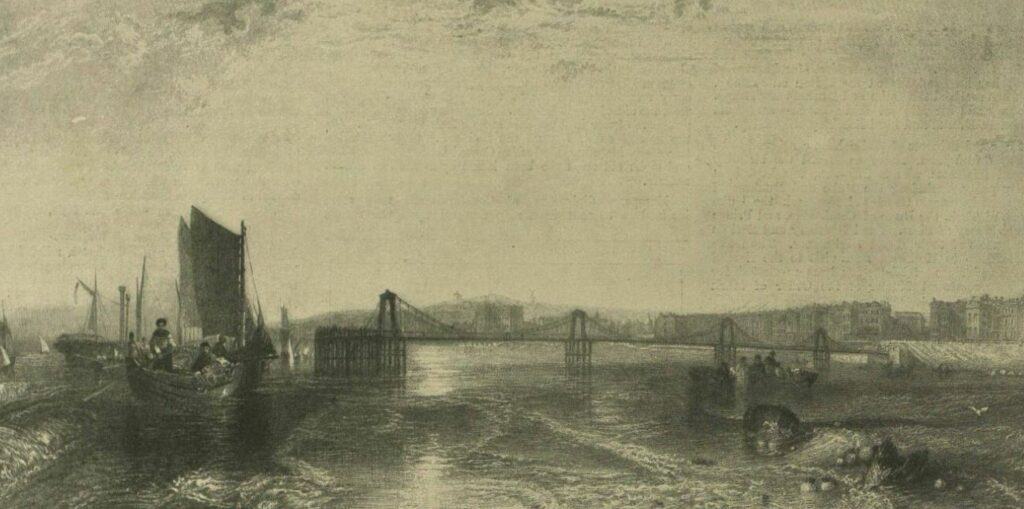
Not fit for purpose as a pleasure pier, Brighton’s West Pier was opened in 1866 as an alternative attraction. And in 1896, the Palace Pier was under construction, and it too would suffer from the effects of the storm.
A day after the storm, on 5 December 1896, our new title the Echo (London) reported on the storm damage at Brighton:
The gale last night wrought fearful havoc at Brighton. The Old Chain Pier has been entirely swept away. After the buffeting it was subjected to in October the pier-head had listed over six feet, and it was expected that the next heavy gale would put an end to it.
The article paints a vivid picture of the storm, and the impact it had upon the old Chain Pier:
Throughout yesterday a tempestuous wind had been blowing, with a rough sea. The wind increased in force as the night wore on, and the decrepit structure was unable to withstand the strain. About half-past ten o’clock there was an ominous swaying of the great suspension chains which, supported by the towers and attached to the land at the shore end of the pier kept it in position. A few moments passed, and the pier had vanished. No other word could be used, for in the blinding rain only a dim outline of the structure could be seen, and those who were watching it could only say ‘it was and it was not.’
As the storm wore on, the Chain Pier was fully destroyed:
It was only a question of moments, but so far as there was any difference in time the middle of the pier first gave way; ‘sank all of a heap,’ to use an expression of an eye-witness. A moment later a crushing sound was heard, and the first pile was shattered. The last to fall was the pier head, where the warning light remained to the end, and then disappeared in the darkness, whilst the great mass of interlaced woodwork crumpled into a heap, shapeless as an upset house of cards. At midnight only the skeleton of the first pile remained, against which the waves were thundering.
Following the destruction of the Chain Pier, the Echo (London) reports how ‘great quantities of wreckage’ were strewn across Brighton’s coastline, with the Palace Pier, which was under construction, coming in ‘for some heavy blows from the floating woodwork.’ The West Pier was also hit by ‘masses of wreckage’ from the Chain Pier.
As the morning light dawned, the damage caused by the storm became clearer. Two piles of the new Palace Pier had been ‘smashed away completely’ by the iron girders of the Chain Pier. Meanwhile, the Echo (London) commented on the historic significance of the latter pier; it was from the pier that Queen Victoria ’embarked for her first voyage out of England,’ whilst it had been visited by many ‘distinguished’ personalities, including prime minister William Gladstone.
The storm had also damaged Volk’s Electric Railway, as reported the Echo (London). Opened in 1883, and now the oldest operational electric railway in the world, the line had only recently been updated. The newspaper reports how:
The new large car, which been taken over to Rottingdean was thrown over and smashed to atoms, the waiting-room and the landing-stage at the Brighton end was wrecked, and the damage here alone is roughly estimated at £4,000.
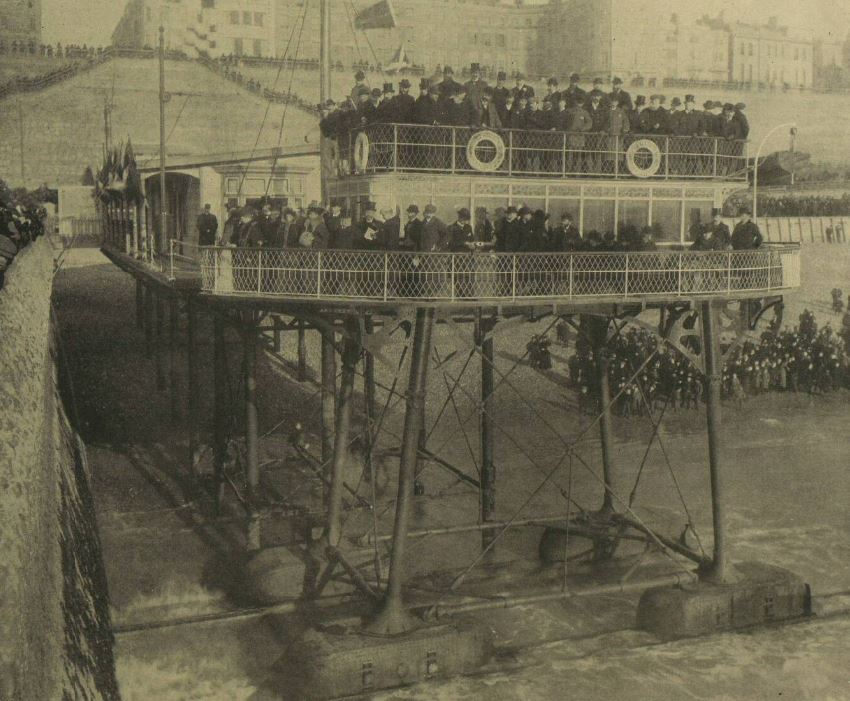
Meanwhile, the storm had swept ‘over the parade to the houses opposite, and great injury was done to boats and bathing-machines.’ The Echo (London) also reports how damage had been done all along the coast, with roads being flooded at Eastbourne, further damage seen in Worthing, and the esplanade at Hythe had been destroyed.
On 8 December 1896 the Echo (London) reported how ‘great crowds assembled on the front at Brighton yesterday to view the damage done by the gale.’ Repair work was underway on the West Pier, which was to close in 1975 and suffer huge damage in the Great Storm of 1987, before finally succumbing to several arson attacks in 2003. Meanwhile, the proprietor of the electric railway, Magnus Volk, was defiant, stating how ‘steps will be taken to avoid the possibility in future of such damage.’ And he took those steps, his electric railway remaining operational to this day.
New Titles
| Title | Years Added |
| Clapham Observer | 1959 |
| Daily Dispatch (Manchester) | 1945 |
| Echo (London) | 1868-1905 |
| Football Mail (Portsmouth) | 1903, 1907, 1956 |
| Leighton Buzzard on Sunday | 1997 |
| Northwich Chronicle | 1927, 1982 |
| Sunday Mail (Glasgow) | 1920, 1927, 1952, 1957-1958, 1964-1965, 1970 |
| Wembley News | 1963 |
Updated Titles
This week we have updated 72 of our existing titles.
You can learn more about each of the titles we add to every week by clicking on their names. On each paper’s title page, you can read a FREE sample issue, learn more about our current holdings, and our plans for digitisation.
You can keep up to date with all the latest additions by visiting the recently added page. You can even look ahead to see what we’re going to add tomorrow.


